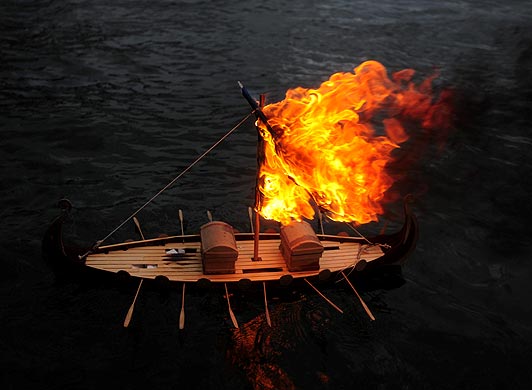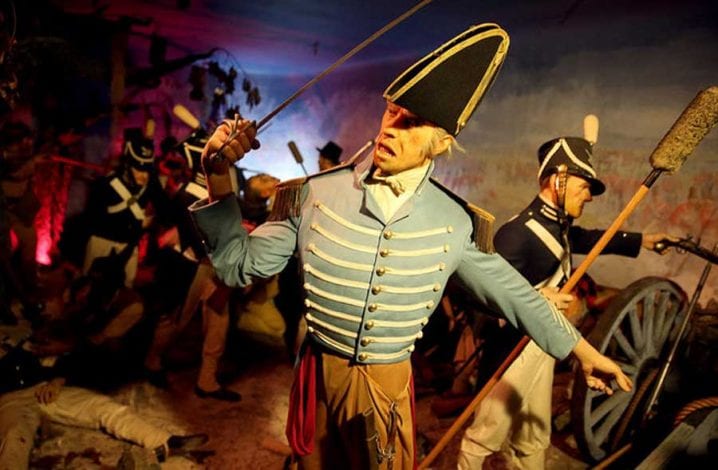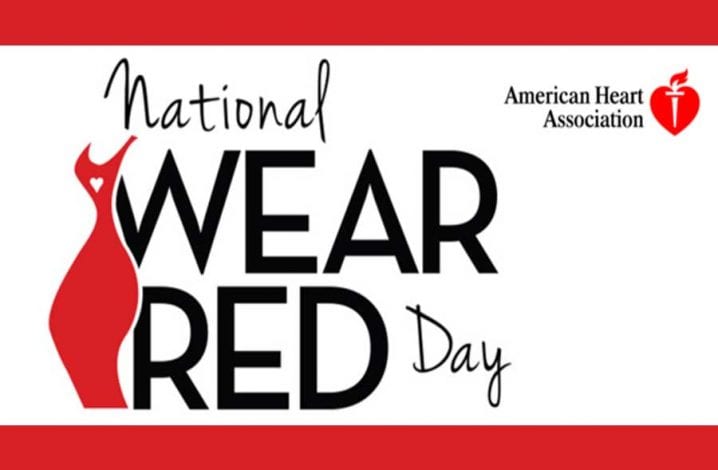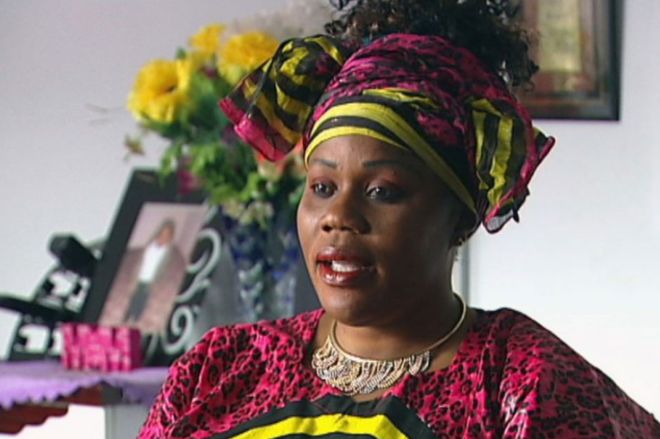
How we grieve, what our last moments look like, and the history of mourning all made it to this week’s news. In the odd department, an Australian woman thwarts her own murder and then at her funeral surprises her husband who had ordered the hit.
Read on to learn more about the stories that showed up on this weeks news wires.
New on the blog this week:
 The Battle of New Orleans as depicted by a wax tableau at Musee Conti. (via nola.com) Making Resinous Replicas of Dead People: Wax Museums of the World |
How scared of death are we really – and how does it affect us?
2/8/2016–theconversation.com: If death is the final taboo, it might not be for much longer. There has, in recent years, been increasing effort to promote conversations about death and dying, both in the home and in more public settings. For example, death cafes, first launched in Switzerland in 2004, have spread around the world, enabling people to speak about their fears over cake and coffee… Read the full story
‘The Good Death,’ ‘When Breath Becomes Air’ and More
2/8/2016–newyorktimes.com: Death goes in and out of fashion. The topic lingers behind euphemisms for a few years, and then someone calls it forth again: Elisabeth Kübler-Ross with her disciplined “On Death and Dying” in 1969; Susan Sontag with her angry but profound “Illness as Metaphor” in 1978 and the empathetic follow-up “AIDS and Its Metaphors,” in 1988; Derek Humphry, implausibly, with his suicide handbook “Final Exit” in 1991; Sherwin Nuland with his magisterial “How We Die” in 1993; more recently… Read the full story
Woman crashes own funeral after husband’s murder plot
2/7/2016–usatoday.com: Noela Rukundo had been with her husband, Balenga Kalala, for 11 years when, last year, she flew from their home in Melbourne, Australia, to her native Burundi for her stepmother’s funeral. While there, Kalala ordered gang members to have her killed. They abducted her and told her what they had been hired to do; Rukundo even heard her husband’s voice on speakerphone telling them to kill her… Read the full story
Transitions: Grieving in different ways
2/6/2016–postcrescent.com: “She is dead to me.” The angry voice came from a sixtyish man across the ICU waiting room that I was in. It is a very private, yet public place. There can be intense family conversations going on nearby, while you are worried about your own special person. He was talking to a woman, maybe his wife. His 90-year-old mother was in surgery and declining. He was talking about his niece. “She is dead to me.” He repeated… Read the full story
Like Baseball Cards, but for Funerals
2/4/2016–theatlantic.com: In a used bookstore in Philadelphia, I paid eight dollars for a collection of dead people. Of course, bookstores generally do not deal in cadavers. But they do sell objects imbued with history: a former owner’s ex libris, an inscribed dedication from an unknown well-wisher, an occasional sales receipt used as a bookmark. What I bought was a small pleather portfolio stuffed with 18 funeral cards—Catholic-inspired memento mori for people I had never met, dating from 1919 to 1962… Read the full story

Viking Funerals have become an offbeat but increasingly popular alternative for many. (Photo Source: thesun.co.uk)
Viking Funerals: Alternative Way to Honor Loved Ones
2/4/2016–homernews.com: Alaskans who have had the bodies of loved ones cremated often look to the wilderness to scatter ashes. People take remains out to their favorite fishing spots or scatter them along hiking or ski trails. A Sadie Cove couple has expanded their lodge operations to offer a new way of interring cremated remains a Viking funeral… Read the full story
What The Dreams Of The Dying Reveal About The Human Spirit
2/3/2016–huffingtonpost.com: Dr. Christopher Kerr was 12 years old when his father died. In the man’s final moments of life, Kerr said in a recent TEDx talk, his father reached out to him and told him to hurry because they needed to catch a plane to go on a fishing trip. It was the last time Kerr saw his father. Death has followed Kerr in one way or another throughout his life, he said in the talk. He tried to avoid and defy it for many years as a medical student and then as an emergency room doctor. But since going to work in hospice care in 1999, Kerr has discovered a hidden value in the dying experience… Read the full story
Our Strange, Unsettled History of Mourning
2/3/2016–newyorker.com: In the spring of last year, I attended a funeral in Pretoria, South Africa, over Skype. A formative friend, who was South African, had died of cancer, at thirty-one. That morning, I woke up at six, made coffee, and then sat on my bed in an old red hoodie; but also, via a laptop perched on the knees of a friend, I sat in the Greek Orthodox Church of Pretoria. Two other friends, one in England and one in Cyprus, were on the call, as well. As familiar as technological marvels have become, the whole thing still felt futuristic and miraculous, compounding the feeling of disbelief, of watching an implausible fiction, that accompanied the death… Read the full story
Meet the death doulas: the women who stay by your side to the end
2/3/2016–theguardian.com: In the upstairs room of Blighty Coffee in north London, two women greet their guests as they file in with cups of tea or glasses of wine. On each table are menus, with delicate morsels of suggested topics for the evening ahead. “What things make for a good death?” reads one. “Can you prepare for death and dying?” says another. As a joint host of the “death cafe”, a monthly event aimed at breaking taboos on the issue, Caroline Dent tells her 20-strong audience in Finsbury Park of her belief that death has become “over-medicalized… Read the full story












